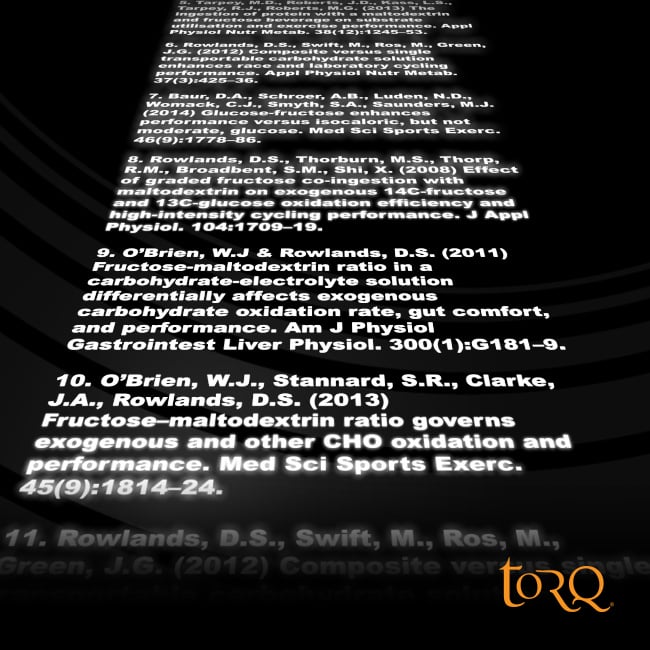TORQ have delivered 2:1 Maltodextrin:Fructose (MF) Rapid Energy Delivery since 2005. If it has been suggested to you by any brand that products formulated at 2:1 MF are somehow revolutionary and new, it’s simply not the case. It certainly was in 2005 when we formulated our first Energy Drink and in 2007 when we incorporated the same 2:1 MF delivery system into our Energy Gels.
We’ve never wasted our time or money seeking celebrity endorsements to try to influence you, we’ve just got our heads down, reviewed the research and produced the finest Performance Nutrition products money can buy. If World Class athletes are using our products, it’s because they want to or have been advised by their nutritionists to do so.

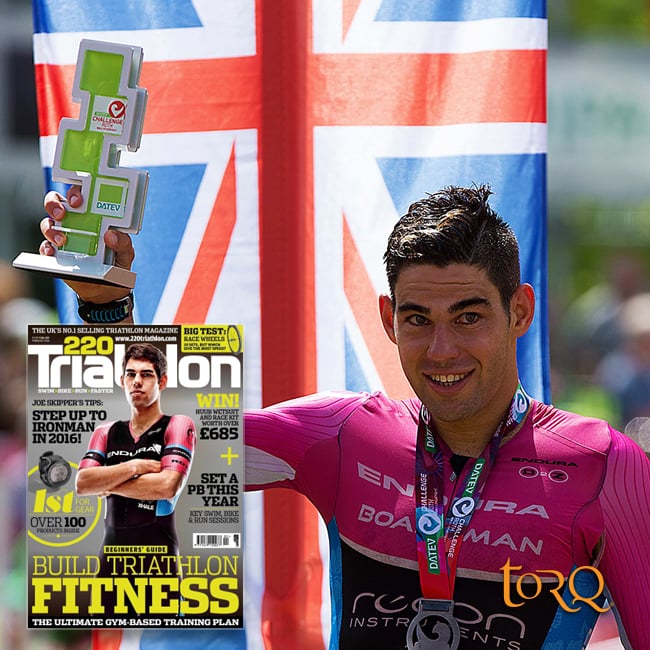
We’ve always been light years ahead in terms of innovation and have worked tirelessly on our natural flavour profiles. Although our 2:1 MF energy drink flavours might sound relatively mainstream (Orange, Lime & Lemon, Pink Grapefruit, Blackcurrant and Vanilla), our energy gel flavour profiles are on another level. How about Rhubarb & Custard, Apple Crumble, Raspberry Ripple, Cherry Bakewell and Lemon Drizzle? Or Black Cherry Yoghurt, Strawberry Yoghurt or Banoffee?
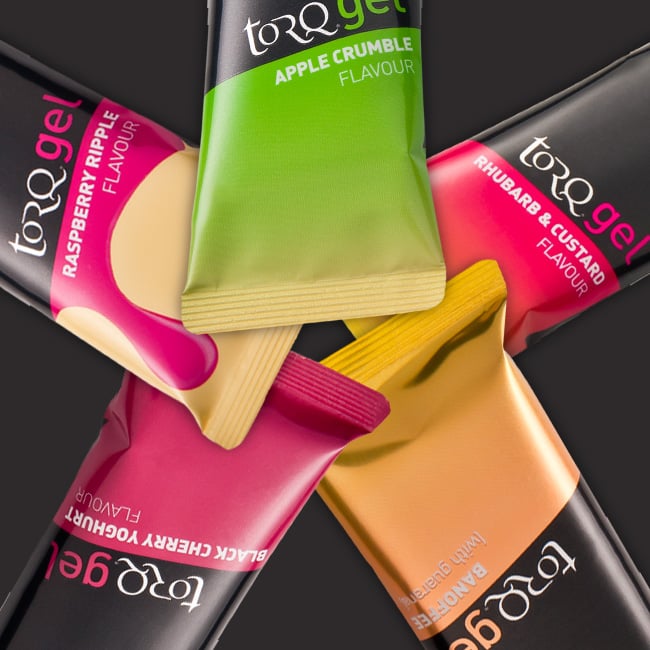
Above all, these exceptionally potent energy products also fit into the TORQ Fuelling System. Conceived way ahead of its time back in 2012, we devised a way to make fuelling endurance performances with optimal carbohydrate delivery extremely simple by organising all of our fuelling products into 30gram carbohydrate units.
To find out more about the TORQ Fuelling System, click on this link:
To find out more about our 2:1 MF TORQ Energy Drink, click on this link:
To find out more about our 2:1 MF TORQ Energy Gels, click on this link:
Other products within the TORQ Fuelling System range which combine a variety of glucose-derivatives with fructose (essentially the same science, because Maltodextrin is a glucose-derivative) are the TORQ Chew and TORQ Bar. For further information on these products, click on the links below:
Together, our energy drinks, gels, bars and chews work as a system to deliver optimal levels of carbohydrate, fluid and electrolytes to the working muscles.
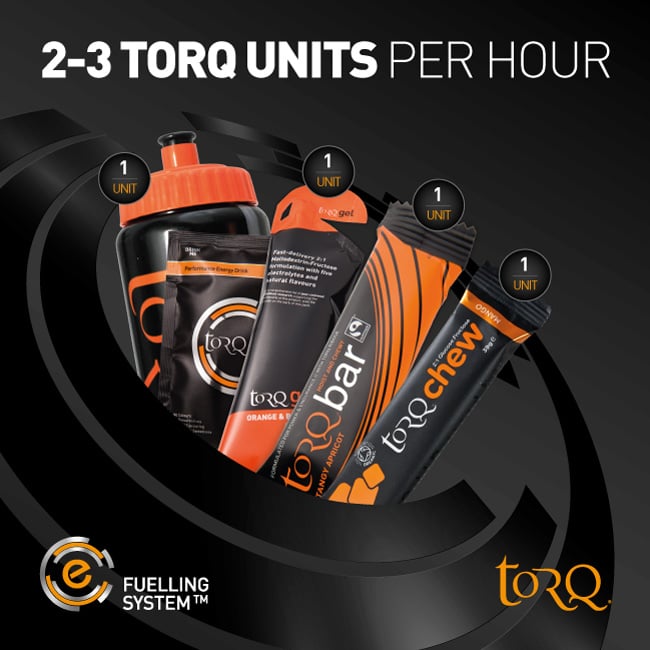
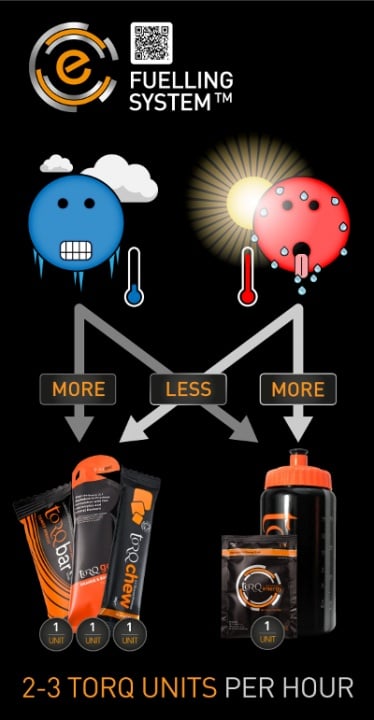
Research References:
- Stellingwerff, T & Cox, GR. (2014)
Systematic review: Carbohydrate supplementation on exercise performance or capacity of varying durations. Appl Physiol Nutr Metab. 2014 Sep;39(9):998-1011. - PB., Ingraham, SJ. (2015)
Glucose-fructose likely improves gastrointestinal comfort and endurance running performance relative to glucose-only. Scand J Med Sci Sports. [Epub ahead of print]. - Currell, K & Jeukendrup, A.E. (2008)
Superior endurance performance with ingestion of multiple transportable carbohydrates. Med Sci Sports Exerc. 40(2):275–81. - Triplett, D., Doyle, D., Rupp, J., Benardot, D. (2010)
An isocaloric glucose-fructose beverage’s effect on simulated 100-km cycling performance compared with a glucose-only beverage. Int J Sport Nutr Exerc Metab. 20(2):122–31 - Tarpey, M.D., Roberts, J.D., Kass, L.S., Tarpey, R.J., Roberts, M.G. (2013)
The ingestion of protein with a maltodextrin and fructose beverage on substrate utilisation and exercise performance. Appl Physiol Nutr Metab. 38(12):1245–53. - Rowlands, D.S., Swift, M., Ros, M., Green, J.G. (2012)
Composite versus single transportable carbohydrate solution enhances race and laboratory cycling performance. Appl Physiol Nutr Metab. 37(3):425–36. - Baur, D.A., Schroer, A.B., Luden, N.D., Womack, C.J., Smyth, S.A., Saunders, M.J. (2014)
Glucose-fructose enhances performance versus isocaloric, but not moderate, glucose. Med Sci Sports Exerc. 46(9):1778–86. - Rowlands, D.S., Thorburn, M.S., Thorp, R.M., Broadbent, S.M., Shi, X. (2008)
Effect of graded fructose co-ingestion with maltodextrin on exogenous 14C-fructose and 13C-glucose oxidation efficiency and high-intensity cycling performance. J Appl Physiol. 104:1709–19. - O’Brien, W.J & Rowlands, D.S. (2011)
Fructose-maltodextrin ratio in a carbohydrate-electrolyte solution differentially affects exogenous carbohydrate oxidation rate, gut comfort, and performance. Am J Physiol Gastrointest Liver Physiol. 300(1):G181–9. - O’Brien, W.J., Stannard, S.R., Clarke, J.A., Rowlands, D.S. (2013)
Fructose–maltodextrin ratio governs exogenous and other CHO oxidation and performance. Med Sci Sports Exerc. 45(9):1814–24. - Rowlands, D.S., Swift, M., Ros, M., Green, J.G. (2012)
Composite versus single transportable carbohydrate solution enhances race and laboratory cycling performance. Applied Physiology, Nutrition, and Metabolism. 37(3): 425-436. - Smith, J.W., Pascoe, D.D., Passe, D., Ruby, B.C., Stewart, L.K., Baker, L.B., et al. (2013)
Curvilinear dose-response relationship of carbohydrate (0–120 g·h−1) and performance. Med Sci Sports Exerc. 45(2):336–41. - Roberts, J.D., Tarpey, M.D., Kass, L.S., Tarpey, R.J., Roberts, M.G. (2014)
Assessing a commercially available sports drink on exogenous carbohydrate oxidation, fluid delivery and sustained exercise performance. J Int Soc Sports Nutr. 11(1):1–14. - Jentjens, R.L., Underwood, K., Achten, J., Currell, K., Mann, C.H., Jeukendrup, A.E. (2006)
Exogenous carbohydrate oxidation rates are elevated after combined ingestion of glucose and fructose during exercise in the heat. J Appl Physiol. 100(3):807–16. - Jeukendrup, A.E & Moseley, L. (2010)
Multiple transportable carbohydrates enhance gastric emptying and fluid delivery. Scand J Med Sci Sports. 20(1):112–21. - Davis, J.M., Burgess, W.A., Slentz, C.A., Bartoli, W.P. (1990)
Fluid availability of sports drinks differing in carbohydrate type and concentration. Am J Clin Nutr. 51(6):1054–7. - Jentjens, R.L., Venables, M.C., Jeukendrup, A.E. (2004)
Oxidation of exogenous glucose, sucrose, and maltose during prolonged cycling exercise. J Appl Physiol. 96(4):1285–91. - Jentjens, R.L., Achten, J., Jeukendrup, A.E. (2004)
High oxidation rates from combined carbohydrates ingested during exercise. Med Sci Sports Exerc. 36(9):1551–8. - Wallis, G.A., Rowlands, D.S., Shaw, C., Jentjens, R.L., Jeukendrup, A.E. (2005)
Oxidation of combined ingestion of maltodextrins and fructose during exercise. Med Sci Sports Exerc. 37(3):426–32. - Jentjens, R.L., Moseley, L., Waring, R.H., Harding, L.K., Jeukendrup, A.E. (2004)
Oxidation of combined ingestion of glucose and fructose during exercise. J Appl Physiol. 96(4):1277–84. - Jentjens, R.L & Jeukendrup, A.E. (2005)
High rates of exogenous carbohydrate oxidation from a mixture of glucose and fructose ingested during prolonged cycling exercise. Brit J Nutr. 93:485–92. - Fuchs, C.J., Gonzalez, J.T., Beelen, M., Cermak, N.M., Smith, F.E., Thelwall, P.E., Taylor, R., Trenell, M.I., Stevenson, E.J., van Loon, L.J. (2016)
Sucrose ingestion after exhaustive exercise accelerates liver, but not muscle glycogen repletion compared with glucose ingestion in trained athletes. J Appl Physi. [Epub ahead of print].
For reviews see…
Jeukendrup, A.E. (2010) Carbohydrate and exercise performance: the role of multiple transportable carbohydrates. Curr Opin Clin Nutr Metab Care. Jul;13(4):452-7.
Rowlands, D.S., Houltham, S., Musa-Veloso, K., Brown, F., Paulionis, L., Bailey, D. (2015) Fructose-Glucose Composite Carbohydrates and Endurance Performance: Critical Review and Future Perspectives. Sports Med. Nov;45(11):1561-76.
